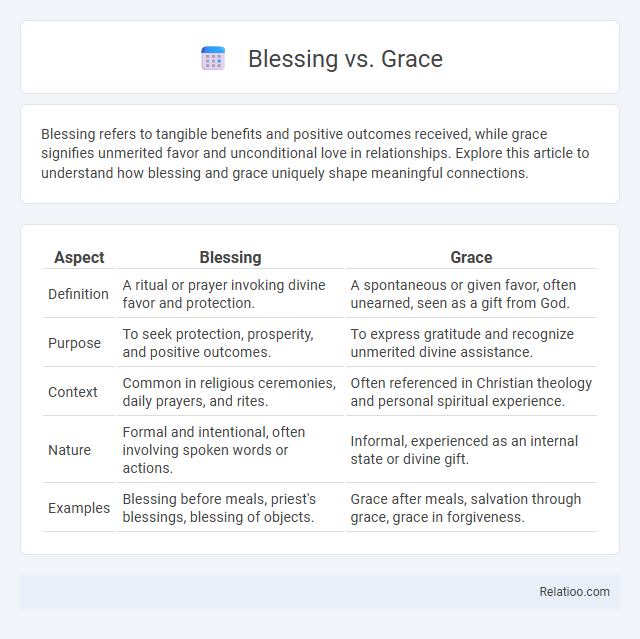Blessing refers to tangible benefits and positive outcomes received, while grace signifies unmerited favor and unconditional love in relationships. Explore this article to understand how blessing and grace uniquely shape meaningful connections.
Table of Comparison
| Aspect | Blessing | Grace |
|---|---|---|
| Definition | A ritual or prayer invoking divine favor and protection. | A spontaneous or given favor, often unearned, seen as a gift from God. |
| Purpose | To seek protection, prosperity, and positive outcomes. | To express gratitude and recognize unmerited divine assistance. |
| Context | Common in religious ceremonies, daily prayers, and rites. | Often referenced in Christian theology and personal spiritual experience. |
| Nature | Formal and intentional, often involving spoken words or actions. | Informal, experienced as an internal state or divine gift. |
| Examples | Blessing before meals, priest's blessings, blessing of objects. | Grace after meals, salvation through grace, grace in forgiveness. |
Understanding the Concepts: Blessing and Grace
Blessing and grace are distinct yet interconnected concepts often explored in religious and spiritual contexts. A blessing refers to a divine favor or gift bestowed upon a person, which can manifest as protection, prosperity, or happiness, while grace signifies unmerited or unconditional love and mercy from a higher power, often offering forgiveness and salvation. Understanding these differences helps Your spiritual growth by recognizing blessings as tangible benefits and grace as the foundational, transformative force sustaining those blessings.
Etymological Roots of Blessing and Grace
The etymological root of "Blessing" stems from the Old English "bledsian" or "bletsian," meaning to consecrate or make holy through a ritual involving blood, evolving to signify divine favor. "Grace" traces back to the Latin "gratia," connected to kindness, favor, and goodwill from God, emphasizing unmerited divine assistance. Understanding these origins helps you appreciate how "Blessing" relates to sanctification, while "Grace" highlights the generosity of divine kindness.
Blessing: Definition and Significance
Blessing refers to a divine favor or protection bestowed upon an individual, often seen as a positive outcome aligned with spiritual or moral goodness. Its significance lies in fostering gratitude and a sense of being chosen or supported by a higher power, enhancing your overall well-being and life purpose. Unlike grace, which emphasizes unmerited kindness, blessings typically involve acknowledgment of specific merits or circumstances.
Grace: Meaning and Spiritual Impact
Grace represents unmerited divine favor that empowers spiritual growth and transformation, distinguishing it from blessings, which are seen as specific gifts or benefits granted by a higher power. Unlike blessings, grace carries a deeper spiritual impact by fostering forgiveness, redemption, and ongoing support in a believer's life. The concept of grace emphasizes continuous divine presence and mercy, enabling individuals to overcome challenges and achieve spiritual renewal.
Scriptural Perspectives on Blessing vs Grace
Scriptural perspectives distinguish blessing as God's favor or gift, often linked to material prosperity and general well-being, while grace emphasizes unmerited divine assistance and salvation through Jesus Christ. Blessing in the Bible frequently involves tangible benefits or protection, whereas grace highlights God's love and mercy that empower and transform your spiritual life. Understanding these terms deepens your appreciation of how God's blessings and grace work together in the believer's journey.
Key Differences Between Blessing and Grace
Blessing refers to a tangible or intangible favor or gift bestowed by a divine source or person, often perceived as a reward or protection. Grace is the unmerited, unconditional love and mercy granted by God, not earned by actions but given freely to cleanse and sustain believers. The key difference lies in blessing being specific benefits or gifts, while grace encompasses the overarching divine favor and forgiveness essential for salvation.
Real-life Examples of Blessing and Grace
Blessing often manifests in real life as tangible gifts or fortunate events, such as receiving unexpected financial support during hardship or achieving personal milestones like a job promotion. Grace is observed in moments of unearned kindness or forgiveness, exemplified by a teacher giving extra help despite a student's negligence or a friend offering unconditional support during difficult times. While both blessing and grace enrich lives, blessings are typically seen as positive outcomes received, whereas grace involves compassionate actions granted without merit.
Blessing and Grace in Different Religions
Blessing and grace are pivotal concepts across various religions, each embodying divine favor but differing in interpretation and application. In Christianity, grace signifies unmerited divine assistance given for regeneration and sanctification, whereas blessing often refers to the invocation of God's favor and protection. Hinduism recognizes blessings (ashirvad) as a bestowal of positive energy from deities or elders, while grace (kripa) is the divine compassion that leads to spiritual liberation, highlighting nuanced differences in spiritual benefits and religious practices.
How to Seek Blessing and Grace in Daily Life
Seeking blessing and grace in daily life involves cultivating gratitude through consistent prayer, meditation, and acts of kindness that open the heart to divine favor. Engaging in spiritual disciplines such as reading sacred texts, participating in community worship, and maintaining humility invites both blessing, understood as God's favor for specific needs, and grace, the unmerited divine assistance empowering personal growth. Developing awareness of blessings found in everyday moments reinforces a mindset that attracts continued grace and sustains spiritual well-being.
The Interplay of Blessing and Grace in Personal Growth
The interplay of blessing and grace profoundly influences personal growth by fostering resilience and spiritual maturity. Blessings often manifest as tangible benefits or positive experiences that provide encouragement, while grace represents the unmerited favor and divine support that sustains individuals through challenges. Together, blessing and grace create a dynamic framework where external abundance and internal transformation converge, enhancing holistic development.

Infographic: Blessing vs Grace
 relatioo.com
relatioo.com